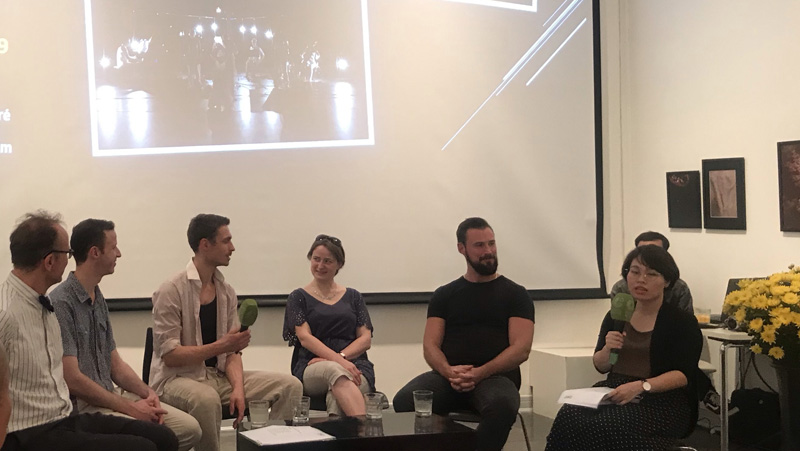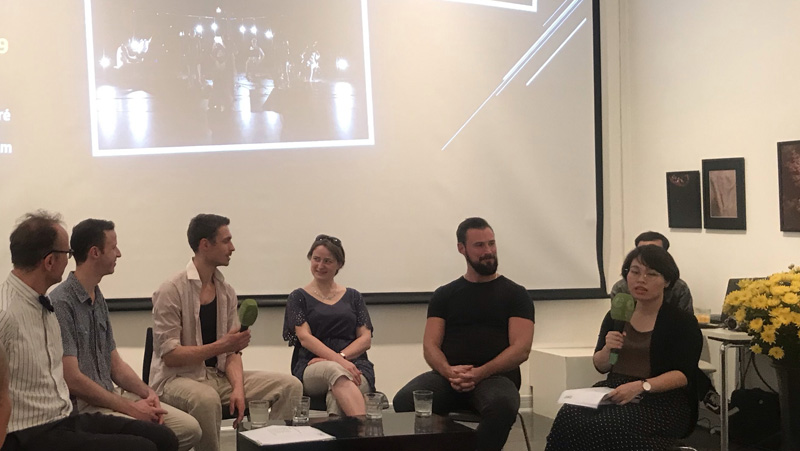
Seven events featuring concerts, workshops and festivals on New Music will take place in Hanoi from February 21 to April 27, with the participation of Vietnamese and international composers and musicians.

The press brief
announcing the launch of New Music show held in Hanoi on February 20.
This information was announced at a press conference
held by the Goethe Institut Hanoi on February 20.
According to Director
of Goethe Institute Vietnam, Wilfried Eckstein, in Vietnam, New Music has
gained considerable importance in cultural life and enjoys growing interest
among the young and old. Vietnamese composers and musicians perform new music
for national and international audiences. Their musical spectrum is
wide-ranging. For them, in addition to the European music of the 20th century
as a reference for the art of composing, there is a multi-faceted Vietnamese
music history ready to inspire and challenge them.
"Acknowledging this
musical wealth and the variety of musical paths, the Goethe-Institut promotes
concerts that break new ground in terms of sound aesthetics. We also look at
the beginnings of New Music in Europe and we promote innovation in Vietnam’s
music.” he said.
The series of events
on New Music will open with a performance of Pierrot Lunaire by Arnold
Schonberg on February 21 at the Youth Theatre, No.11 Ngo Thi Nham street, Hanoi.
The eight musicians are specialised in contemporary music and experimental
playing practices at the interface between performance, improvisation and the
interpretation of composed music.
The programme will
include a Multimedia Concert composed by Vietnamese artist Luong Hue Trinh
under the direction of conductor Jef von der Schmidt, which combines
traditional Vietnamese music with contemporary composition and improvisation.
The performance is considered as an aesthetic exploration into the role of women
today. Vietnamese artists will also perform their talent at a concert by
Vietnamese composer Ton That Tiet, Nguyen Thien Dao and Vu Nhat Tan. The
performance will be based on the Vietnamese concept of the Five Natural
Elements.
The series of events will
also include performances that broaden the artistic message in terms of sound,
melody, rhythm, shape and the use of media. New music is searching for new
sounds, new forms or novel combinations of old styles, whether it continues
existing traditions or deliberately breaks with them.
Source: NDO
With an increasingly vibrant and widespread emulation movement aimed at building cultured residential areas and cultured families, Yen Thuy District has been making steady progress toward improving both the material and spiritual well-being of its people, while fostering a civilized, prosperous, beautiful, and progressive community.
Once lacking recreational spaces and community facilities, Residential Group 2 in Quynh Lam Ward (Hoa Binh City) has recently received attention for the construction of a new, spacious, and fully equipped cultural house. The project followed the model of state support combined with public contributions in both labor and funding.
The "All people unite to build cultural life" movement, which has been effectively integrated with Kim Boi district’s socio-economic development goals, is fostering a lively spirit of emulation across local residential areas, hamlets, villages, public agencies, and enterprises. In addition, through the initiative, traditional cultural values are being preserved and promoted, while community solidarity and mutual support in poverty reduction and economic development are being strengthened.
A working delegation of the Hoa Binh provincial People’s Committee led by its Permanent Vice Chairman Nguyen Van Toan on June 11 inspected the progress of a project to build the Mo Muong Cultural Heritage Conservation Space linked to tourism services in Hop Phong commune, Cao Phong district.
Born and growing in the heroic land of Muong Dong, Dinh Thi Kieu Dung, a resident in Bo town of Kim Boi district, in her childhood was nurtured by the sweet lullabies of her grandmother and mother. These melodies deeply imprinted on her soul, becoming an inseparable part of her love for her ethnic group's culture. For over 20 years, this love for her hometown has driven Dung to research, collect, and pass down the cultural values of the Muong people to future generations.
In the final days of May, the Ethnic Art Troupe of Hoa Binh Province organized performances to serve the people in remote, mountainous, and particularly disadvantaged areas within the province. These were not just ordinary artistic shows, but they were the meaningful journeys aimed at spreading cultural values, enhancing the spiritual life of the people and contributing to the preservation of ethnic minority cultural identities.



